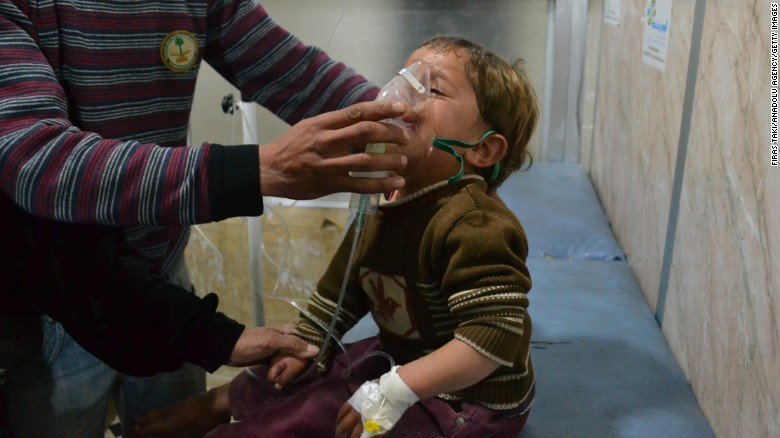Source: The Washington Post – by Josh Rogin (Will Trump let Assad get away with using chemical weapons in Syria?)
The Trump administration maintains that it won’t tolerate chemical weapons attacks by Bashar al-Assad’s regime and its partners in Syria, despite reported widespread use of chlorine gas, along with credible reports of the nerve agent sarin. But there’s no real plan to stop these war crimes, and America’s credibility is on the line.
As the Syrian war enters its eighth year, national security adviser H.R. McMaster called Thursday for punishing Moscow and Tehran for their part in ongoing atrocities in Syria. Such actions, he suggested, should have serious political and economic consequences.
“All civilized nations must hold Iran and Russia accountable for their role in enabling atrocities and perpetuating human suffering in Syria,” McMaster said at the U.S. Holocaust Memorial Museum. “Assad should not have impunity for his crimes, and neither should his sponsors,” he continued.
The regime’s attacks on civilians are worst now in the Damascus suburb of Eastern Ghouta. Roughly 400,000 people are besieged by Assad’s forces, supported by Iranian-backed militias and Russian air power. The bombs raining down often disperse deadly gas. The U.N. special envoy for Syria has called Eastern Ghouta the “epicenter of suffering.”
It’s unclear what the Trump administration is prepared to do about it. U.S. Ambassador to the U.N. Nikki Haley threatened last week that President Trump would respond militarily, as he did last April, if chemical weapons use continued. “When the international community consistently fails to act, there are times when states are compelled to take their own action,” she said at the U.N. Security Council.
Diplomats around the world scrambled to analyze the credibility of Haley’s threat. Gen. Valery Gerasimov, chief of the general staff of Russia’s armed forces, warned that Russia would strike back this time. Deputy Foreign Minister Sergei Ryabkov called in Jon Huntsman, U.S. ambassador to Moscow, to convey the same warning privately.
Haley’s comments were cleared through the interagency process, but no decision on military force has been made. The Pentagon doesn’t favor attacking Assad near Damascus, although Defense Secretary Jim Mattis said recentlythat “it would be very unwise” for Assad to continue using weaponized gas. Secretary of State Rex Tillerson favored negotiation with Moscow — before he was fired. Trump’s personal views are unknown.
Before any strike, the Trump administration would have to build an ironclad case of chemical weapons use, nearly impossible given the chaotic situation on the ground. White Helmets rescue workers and local doctors have collected ample evidence of chorine attacks, but verification could take months.
“We have a higher standard to make sure we understand precisely what took place … so that our response can meet the threat,” CIA Director and Secretary of State nominee Mike Pompeo said March 11.
That leaves the United States and its partners searching for other tools. Haley’s staff is trying earnestly to negotiate a new cease-fire resolution at the United Nations, as well as a new resolution on monitoring chemical weapons use. In 2013, President Barack Obama’s threat of force preceded a deal with Moscow on chemical weapons. But there’s little chance that Russia will allow anything meaningful to succeed this time around.
Nevertheless, there’s much the United States can do. The Holocaust Museum issued a report last week recommending ways to protect civilians from chemical and other weapons. The report focuses on raising pressure on Moscow and Tehran, securing humanitarian access, supporting civil society in liberated areas and pursuing accountability for war criminals.
The House has already passed legislation to impose sanctions on Assad for war crimes and halt the flow of weapons used to kill civilians. The law is named after “Caesar,” the Syrian military photographer who smuggled out 55,000 images proving the Assad regime’s torture and murder of civilians in custody. Senate Foreign Relations Committee Chairman Bob Corker (R-Tenn.) prefers alternate legislation focusing more on investigating war crimes. The Trump administration hasn’t come out in favor of either approach.
If nothing happens before Eastern Ghouta falls, Haley and McMaster’s bluff will have been called. That spells disaster for upcoming diplomatic standoffs with Assad, Russia and Iran in other parts of Syria.
“Assad is challenging the will and the seriousness of the Trump administration,” said Hadi Al-Bahra, of the Syrian opposition negotiations commission. “As long as the regime can continue bombing with no consequences, they will never sit down at the negotiating table.”
The fallout will extend beyond Syria. In September 2013, then-Rep. Pompeo (R-Kan.) and Sen. Tom Cotton (R-Ark.) argued in a Post op-ed that the U.S. failure to respond to chemical weapons use in Syria would embolden not only Assad but also other rogue actors, including Iran and North Korea. “Core U.S. national security interests are implicated in Syria,” they wrote.
That was right then and is still right now. When it comes to protecting Syrian civilians from chemical weapons, our interests and our morals align. So long as the atrocities continue, the flow of refugees will increase, extremism will worsen and the war will never end.



COMMENTS